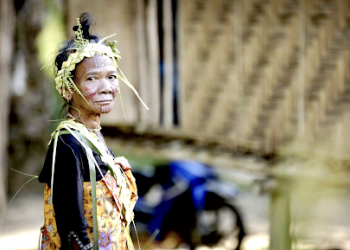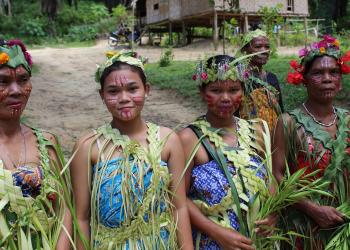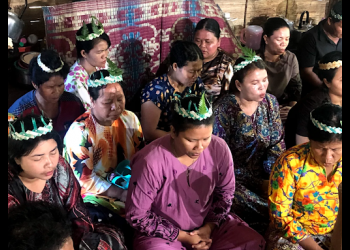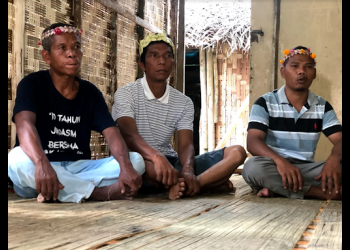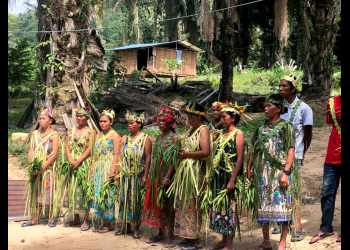Glimpses into the Spirit of Gender Equality: Kejau, Malaysia
The following is part of a series exploring how Baha’i communities have seen the principles of gender equality outlined in the Beijing Declaration and Platform for Action begin to take form in neighborhoods and villages around the world.
Perched astride a mountaintop in the main range of Peninsular Malaysia, the village of Kejau is an hour’s motorcycle ride from the nearest town and an hour’s walk from the closest government primary school. Access to educational institutions has long been challenging. Yet a local process of education, spiritual and moral as much as intellectual and academic, is fueling widespread movement among its residents toward greater expressions of the equality of women and men.
"Education is our greatest concern for all our people," says Nasir Bah Mandong, one of the village chiefs. "An hour's walk is too much for a little child, especially the girls. Most cannot make the journey until they are older. That is why we collectively started the community school—to give these children a head start."
Faith in the capacity of local residents has been central to the development of the school, together with an associated network of neighborhood classes for the spiritual education of children. The school’s first teacher was a local woman named Ovasah Yok Mapah who had not been able to complete her own secondary education because of obligations to care for her siblings and help with domestic chores.
Determined that girls should have opportunities equal to those of boys, she completed a series of courses focused on building capacity to teach children, and started the village’s first class with six children in her own home. She subsequently trained four other teachers, who now help her run the school, which serves all the children in the village of several hundred.
"It is important for girls as well as boys to have access to education,” says Jamil Eigau, chairperson of the local governing body of the Baha’i community of Kejau. “No girl child should be illiterate, as they are the future mothers."
Central to this process of education, grounded in the teachings of the Baha’i Faith, are a variety of concrete activities—including but not limited to classes for children—by which participants of any background learn to put spiritual principles into practice in their immediate surroundings.
Gatherings for collective worship open to all, for example, have played a key role in overcoming age-old patterns of discrimination and prejudice, says Norisa Yok Phut Phut, an entrepreneur in Kejau.
"Before, only men conducted Sewang, the traditional prayer,” she explains. “Now the women in our village gather together to pray and study. We teach the prayers to our children to protect themselves as they travel through the jungle paths.”
She adds that the opportunity to learn prayers and holy writings in Semai, the traditional language of this group of indigenous Orang Asli people, has been a particularly transformative aspect of the educational process.
“This has helped many women build their capacity to participate more fully in community affairs. Now women also join the consultation. We can share our concerns and our views."
Increasing awareness of the practical implications of gender equality is also influencing patterns of family life and traditional marriage practices, says Marjinie Deraoh, a coordinator of the community schools program in the Asli region of the country.
“In the past, marriage was contracted after the boy and the girl stayed together for three nights. This practice sometimes disadvantaged girls,” she explains. “But as we study more, this tradition began to change to one that honours the chastity of both boys and girls."
Today the educational process is nurturing over 100 sustained and participant-led activities in Kejau alone, each committed to the equality of women and men as a truth of human reality. The result is a vibrant process of learning about how the principle of gender equality can be steadily translated into lived reality.
“Women are coming to understand that they can go far and have much to contribute to the environment they are living in,” says Goh Siew Chuan, an accountant from another village in the country participating in a course on improving family life.
“Men are seeing women’s growing capacity as a strength and an advantage, not as a threat to their traditional roles.”
Her husband, Tee Yuu Hock, agrees. “Both are realizing the importance of the role that women can and will play in society, going forward.”
